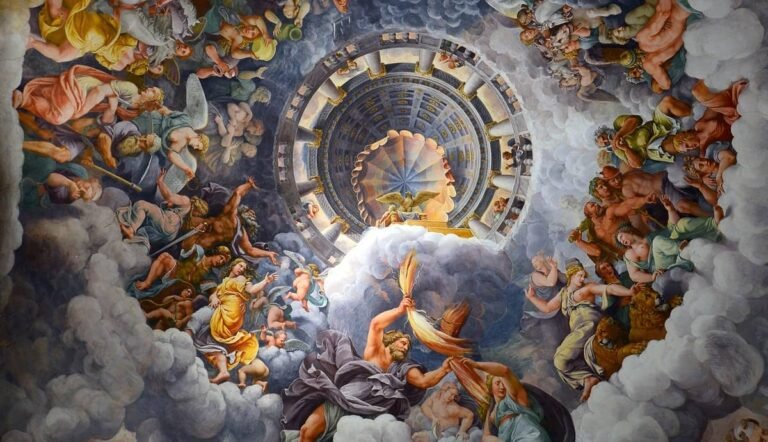
Theseus
Theseus was a divine hero and the founder of Athens from Greek mythology. The myths surrounding Theseus, his journeys, exploits, and friends, have provided material for storytelling throughout the ages.
Theseus is sometimes described as the son of Aegeus, King of Athens, and sometimes as the son of the god Poseidon. He was raised by his mother, Aethra, and, upon discovering his connection to Aegeus, travels overland to Athens, having many adventures on the way. When he reaches Athens, he finds that Aegeus is married to Medea (formerly wife of Jason), who plots against him. Aegeus, one of the primordial kings of Athens, was childless. Desiring an heir, he asked the Oracle of Delphi for advice. Her cryptic words were "Do not loosen the bulging mouth of the wineskin until you have reached the height of Athens, lest you die of grief." Aegeus did not understand the prophecy and was disappointed. He asked the advice of his host Pittheus, king of Troezen. Pittheus understood the prophecy, got Aegeus drunk, and gave Aegeus his daughter Aethra. Following the instructions of goddess Athena in a dream, Aethra left the sleeping Aegeus and waded across to the island of Sphairia that lay close to Troezen's shore. There, she poured a libation to Sphairos (Pelops's charioteer) and Poseidon and was possessed by the sea god in the night. The mix gave Theseus a combination of divine as well as mortal characteristics in his nature; such double paternity, with one immortal and one mortal, was a familiar feature of other Greek heroes. After Aethra became pregnant, Aegeus decided to return to Athens. Before leaving, however, he buried his sandals and sword under a huge rock and told Aethra that when their son grew up, he should move the rock, if he were heroic enough, and take the tokens for himself as evidence of his royal parentage. In Athens, Aegeus was joined by Medea, who had left Corinth after slaughtering the children she had born to Jason, and had taken Aegeus as her new consort. Thus Theseus was raised in his mother's land. When Theseus grew up to be a young man, he moved the rock and recovered his father's tokens. His mother then told him the truth about his father's identity and that he must take the sword and sandals back to the king Aegeus to claim his birthright. To journey to Athens, Theseus could choose to go by sea (which was the safe way) or by land, following a dangerous path around the Saronic Gulf, where he would encounter a string of six entrances to the Underworld each guarded by a chthonic enemy. Young, brave, and ambitious, Theseus decided to go alone by the land route and defeated many bandits along the way. The six entrances to the Underworld, more commonly known as the Six Labours, are as follows :
- At the first site, which was Epidaurus, sacred to Apollo and the healer Asclepius, Theseus turned the tables on the chthonic bandit, Periphetes, the Club Bearer, who beat his opponents into the Earth, taking from him the stout staff that often identifies Theseus in vase-paintings. At the Isthmian entrance to the Underworld was a robber named Sinis, often called "Pityokamptes" (Greek : Πιτυοκάμπτης, "he who bends Pinetrees"). He would capture travelers, tie them between two pine trees that were bent down to the ground, and then let the trees go, tearing his victims apart. Theseus slew him by his own method. He then seduced Sinis's daughter, Perigune, fathering the child Melanippus. In another deed north of the Isthmus, at a place called Crommyon, he killed an enormous pig, the Crommyonian Sow, bred by an old crone named Phaea. Some versions name the sow herself as Phaea.
- Near Megara, a robber named Sciron forced travelers along the narrow cliff-face pathway to wash his feet. While they knelt, he kicked them off the cliff behind them, where they were eaten by a giant turtle (or, in some versions, a sea monster). Theseus pushed him off the cliff where he was eaten as well.
- Another of these enemies was Cercyon, king at the holy site of Eleusis, who challenged passers-by to a wrestling match and, when he had beaten them, killed them. Theseus beat Cercyon at wrestling and then killed him instead.
- The last bandit was Procrustes the Stretcher, who had two beds, one of which he offered to passers-by in the plain of Eleusis. He then made them fit into it, either by stretching them or by cutting off their feet. Since he had two beds of different lengths, no one would fit. Theseus once again employed Procrustes' own method on him, cutting off his legs and decapitating him with his axe.
People could now travel freely. He ended up in Athens where Aegeus, seeing his sword and sandals, immediately recognized him and welcomed him with joy and relief.
A few years before Theseus arrived in Athens, the Athenians celebrated to honor Athena and held “Panathinaic Games”. Androgeos, son of Minos, king of Crete, also took part in the games. He won in all the competitions and because of this some Athenians out of jealousy killed him. Minos came with many ships and besieged Athens. He defeated the Athenians and forced them to pay him tribute. Every year they had to send him seven young women and seven young men to be eaten by the Minotaur.
The Minotaur was a monster with the head of a bull and the body of a human. He lived locked in the labyrinth, in the basement of Minos's palace, built by the Athenian Daedalus. It had so many corridors and rooms that no one had ever managed to get out of there. When Theseus arrived in Athens, for the third year the Athenians had to send their children to Crete, and all over the city wails and cries were heard. Theseus decided to go with them to kill the Minotaur. At the port of Faliro, everyone said goodbye to them crying. They put black sails on the ship and King Aegeus begged them, if they returned alive, to put white sails. The ship arrived in Crete. There Theseus met Minos' daughter, Ariadne. Dazzled by the beauty of Theseus, she wanted to help him. So she gave him a ball of thread, the mito, and advised him to tie the end of it at the entrance of the labyrinth and unwind it. Theseus bravely entered the labyrinth and searched for the Minotaur, unraveling the tangle. At some point she heard his wild roar. When they met, they fought hard. Theseus killed the terrible monster with his sword 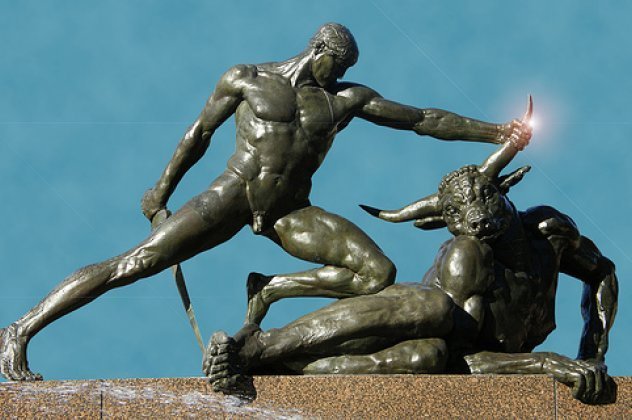 and came out of the labyrinth collecting the thread. At the entrance, the young people of Athens welcomed him with tears of joy and relief.
and came out of the labyrinth collecting the thread. At the entrance, the young people of Athens welcomed him with tears of joy and relief.
That same night, Theseus and the young men of Athens secretly left Crete in their ship. They took Ariadne and Phaedra with them. Previously they made holes in the ships of Minoan, so that they could not follow them. They traveled happily to Naxos. There they went out to a beach to rest. But then the god Dionysos passed by. He saw Ariadne, was dazzled by her beauty and took her to be his wife. Theseus was very saddened by the loss of Ariadne. The ship continued its journey to Athens, but no one thought that the black sails should be changed. Meanwhile, Aegeus from Cape Sounio kept looking at the sea, hoping at some point to see the ship returning. And when one day the ship appeared on the horizon with black sails  , out of his great sorrow he fell from the rock into the sea and drowned. The sea where he fell was called the Aegean Sea.
After the death of Aegeus, Theseus became king of Athens and reigned for many years with wisdom and justice. He later married Phaedra, Ariadne's sister. Once, however, he traveled far. When he returned, he had lost his throne. Disappointed, he decided to live the rest of his life in Skyros, where he had paternal estates. When he arrived in Skyros, King Lycomedes welcomed him and offered to show him his estates himself. Theseus, who considered him as his friend, went with him. But he pushed him over a cliff and killed him. He was buried in Skyros. Later, however, the general Kimon moved his bones to a sanctuary in the Ancient Agora of Athens, which was called Theseio.
, out of his great sorrow he fell from the rock into the sea and drowned. The sea where he fell was called the Aegean Sea.
After the death of Aegeus, Theseus became king of Athens and reigned for many years with wisdom and justice. He later married Phaedra, Ariadne's sister. Once, however, he traveled far. When he returned, he had lost his throne. Disappointed, he decided to live the rest of his life in Skyros, where he had paternal estates. When he arrived in Skyros, King Lycomedes welcomed him and offered to show him his estates himself. Theseus, who considered him as his friend, went with him. But he pushed him over a cliff and killed him. He was buried in Skyros. Later, however, the general Kimon moved his bones to a sanctuary in the Ancient Agora of Athens, which was called Theseio. 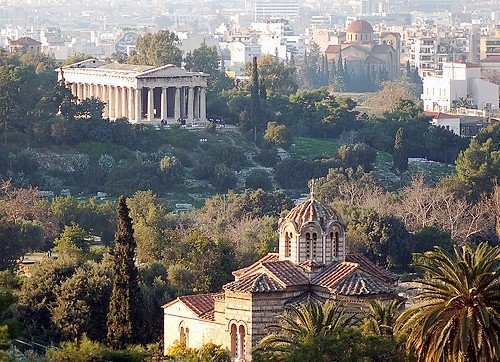
Achilles, Neoptolemus
Achilles was the child of a mortal and a goddess, Peleus king of Myrmidons (ancient Thessalian Greek tribe) and Thetis, who was a Nereid sea nymph. Thetis, in order to make her son immortal, immersed him in the water of Styx 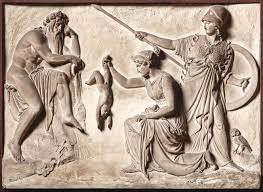 , the river of Ades which had the magical ability to make every creature immortal. But, as Thetis dipped Achilles in the water, the heel where she caught him did not get wet and thus remained vulnerable (Achilles heel). On this heel, Paris will later shoot him with an arrow with the help of god Apollo.
, the river of Ades which had the magical ability to make every creature immortal. But, as Thetis dipped Achilles in the water, the heel where she caught him did not get wet and thus remained vulnerable (Achilles heel). On this heel, Paris will later shoot him with an arrow with the help of god Apollo.
According to mythology, Thetis, fearing the oracle that said her son would be killed if he went to the Trojan War, brought him to Skyros in her sea chariot to protect him. To protect him she dressed him in women's clothes and hid him in the palace of King Lycomedes, where he grew up with the king's daughters. Achilles arrived there at the age of 9 and stayed for 9 full years under the name Pyrrha (red-haired). With Lycomedes' daughter Deidamia, with whom he had begun a relationship, Achilles there fathered two sons, Neoptolemus (also called Pyrrhus, after his father's possible alias) and Oneiros.
According to the prophecy of Calchas, in order for the Greeks to conquer Troy, Achilles had to join them. Odysseus went to Skyros in the guise of a peddler selling women's clothes and jewellery and placed a shield and spear among his goods. When Achilles instantly took up the spear, Odysseus saw through his disguise and convinced him to join the Greek campaign  . Achilles was then revealed himself. So they persuaded him to follow them and fled from the coast of the island, which was named "Achillio". The hero went to Troy and fought bravely and found death as the prophecy has spoken.
. Achilles was then revealed himself. So they persuaded him to follow them and fled from the coast of the island, which was named "Achillio". The hero went to Troy and fought bravely and found death as the prophecy has spoken.
Achilles is connected with the Myrmidons and the Thessalian land of Magnesia, after being raised by Chiron, and with Skyros as the "island of the Magnets" with the arrival of the Thessalian Assassins. The myth perhaps demonstrates the expulsion of the Cretans Eneas and Lykomedes and the establishment of a colony from Thessaly represented by Achilles.
According to the oracle of Calchas, the presence of Neoptolemus 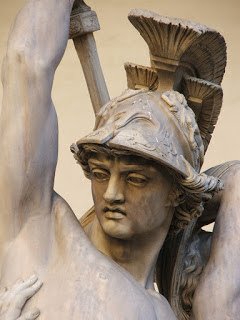 was imperative in order to take Troy. That is why Odysseus had returned to Skyros, took Neoptolemus with him and the two of them conquered Troy with the trick of the “Trojan Horse”. So Neoptolemus fulfilled the oracle that wanted him destined by the gods to take his father's place, to be glorified and proud of his origin from "mysterious Skyros" and became the third mythical hero of the island.
was imperative in order to take Troy. That is why Odysseus had returned to Skyros, took Neoptolemus with him and the two of them conquered Troy with the trick of the “Trojan Horse”. So Neoptolemus fulfilled the oracle that wanted him destined by the gods to take his father's place, to be glorified and proud of his origin from "mysterious Skyros" and became the third mythical hero of the island.
